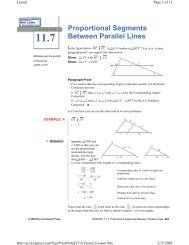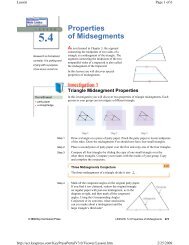Medieval Europe and the Ottoman Empire - Redmond School District
Medieval Europe and the Ottoman Empire - Redmond School District
Medieval Europe and the Ottoman Empire - Redmond School District
You also want an ePaper? Increase the reach of your titles
YUMPU automatically turns print PDFs into web optimized ePapers that Google loves.
Saladin’s Rise to Power Salah-al-Din was known to <strong>Europe</strong>ans as<br />
Saladin (SAL•uh•dihn). As a young man, Saladin was more interested<br />
in studying Islam than warfare. But he eventually joined an uncle<br />
who was a military leader in Syria. Saladin went with a Syrian army<br />
to defend Egypt against <strong>the</strong> Crusaders. After <strong>the</strong> war, he took over <strong>the</strong><br />
Egyptian government. Saladin began to unify Muslims in <strong>the</strong> region,<br />
<strong>and</strong> <strong>the</strong>n he turned his attention to <strong>the</strong> Crusaders still in Palestine.<br />
In 1187, Saladin ga<strong>the</strong>red a large force to attack <strong>the</strong> Crusader<br />
states. Saladin’s forces won many victories <strong>and</strong> recaptured Jerusalem. It<br />
did not take long for news of Saladin’s victories to reach <strong>Europe</strong>.<br />
The Third Crusade After <strong>the</strong> fall of Jerusalem, <strong>the</strong> pope called<br />
for ano<strong>the</strong>r Crusade. Some of <strong>Europe</strong>’s most powerful leaders went<br />
on <strong>the</strong> Third Crusade (1189–1192). Among <strong>the</strong>m was <strong>the</strong> English<br />
king Richard <strong>the</strong> Lion-Hearted. Richard became <strong>the</strong> Crusaders’<br />
leader because of his courage <strong>and</strong> skill in battle. The Crusaders were<br />
successful at first, but <strong>the</strong>y did not achieve <strong>the</strong>ir main goal of retaking<br />
Jerusalem. In 1192, Saladin <strong>and</strong> Richard agreed to a truce. Jerusalem<br />
would remain under Muslim control. However, in return, Saladin<br />
agreed to allow Christian pilgrims to visit <strong>the</strong> city’s holy places.<br />
The Fourth Crusade The truce did not last, <strong>and</strong> a Fourth Crusade<br />
(1202–1204) was launched. To pay <strong>the</strong> Italian traders who were<br />
transporting <strong>the</strong>m, <strong>the</strong> Crusaders agreed to attack <strong>the</strong> Byzantine city<br />
of Zara. The Crusaders <strong>the</strong>n sacked Constantinople to put a political<br />
ally in charge of <strong>the</strong> Byzantine <strong>Empire</strong>. The pope was furious with <strong>the</strong><br />
Crusaders for attacking Christian cities, but he could not stop <strong>the</strong>m.<br />
The Crusaders did not continue <strong>the</strong> Crusade. The Byzantine <strong>Empire</strong><br />
was fur<strong>the</strong>r weakened as a result of <strong>the</strong> Fourth Crusade.<br />
What was <strong>the</strong> key to <strong>the</strong> success of <strong>the</strong> Muslim armies?<br />
Muslims Recapture Palestine<br />
ESSENTIAL QUESTION What were some effects of <strong>the</strong> Crusades on <strong>Europe</strong>?<br />
<strong>Europe</strong> began more Crusades, but by 1270, <strong>the</strong> Muslims had driven<br />
<strong>the</strong> Crusaders out of Palestine, <strong>and</strong> <strong>the</strong> wars ended. The Crusades did<br />
not have a permanent effect on Muslims in Palestine. People’s daily<br />
lives continued much as <strong>the</strong>y had before <strong>the</strong> Crusades.<br />
But Christian traders remained in Palestine, <strong>and</strong> <strong>Europe</strong>an<br />
pilgrims continued to visit <strong>the</strong>ir religion’s Holy L<strong>and</strong>. Both <strong>the</strong> traders<br />
<strong>and</strong> <strong>the</strong> pilgrims maintained a cultural exchange with <strong>the</strong> Turkish,<br />
Arab, Persian, <strong>and</strong> African cultures present in <strong>the</strong> region.<br />
<strong>Medieval</strong> <strong>Europe</strong> <strong>and</strong> <strong>the</strong> <strong>Ottoman</strong> <strong>Empire</strong> • 329








